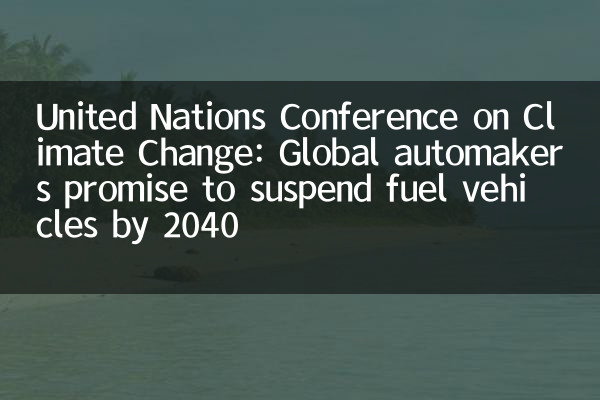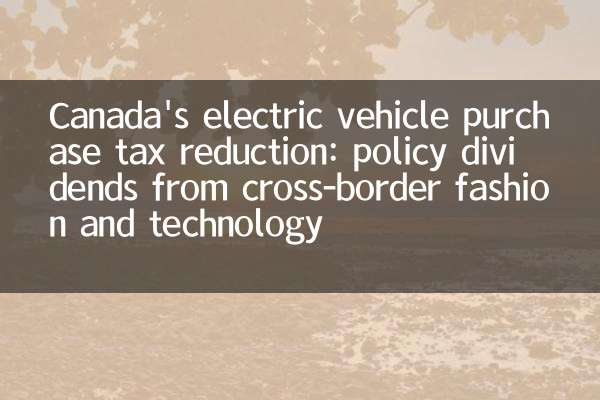United Nations Conference on Climate Change: Global automakers promise to suspend fuel vehicles by 2040
At the just-concluded UN Climate Change Conference, major automakers around the world jointly announced a historic commitment:Fuel vehicles will be completely suspended by 2040. This decision quickly became a hot topic around the world and triggered a chain reaction in all sectors of society. This article will analyze the joint effects of this commitment based on the hot data of the entire network for the past 10 days.
1. The core content of global automakers’ commitments

The car companies participating in the commitment include traditional giants such as Volkswagen, General Motors, Ford, Mercedes-Benz, and Volvo, as well as emerging electric car companies such as Tesla and NIO. The following are the specific commitments:
| Car company name | Fuel car suspension time | Electric vehicle share target (2030) |
|---|---|---|
| Volkswagen Group | 2040 | 70% |
| General Motors | 2040 | 100% |
| Ford Motor | 2040 | 50% |
| Benz | 2039 | 50% |
| Volvo | 2030 | 100% |
2. Chain reaction of the industrial chain
This commitment immediately caused shock in the global industrial chain. According to financial media reports in the past 10 days, the following changes have occurred in the relevant industries:
| Areas of influence | Specific performance | Data changes |
|---|---|---|
| Lithium battery industry | Stock price surges | Average increase of 23% |
| Traditional parts | Enterprise transformation accelerates | 34 companies announce layoffs |
| Charging pile construction | Investment surges | Global investment of $12 billion |
| Oil demand | Long-term expectations downgrade | 2040 forecast cuts by 15% |
3. Changes in consumer attitudes
Social media monitoring shows that the topic has reached discussions in the past 10 days5.2 million. The main consumer concerns are as follows:
| Points of concern | Percentage | Typical comments |
|---|---|---|
| Electric car price | 42% | "Can ordinary families afford it?" |
| Convenience of charging | 28% | "Is the community charging pile enough?" |
| Used car value | 15% | "Will fuel vehicles depreciate faster?" |
| Technology maturity | 10% | "Can winter battery life be solved?" |
| other | 5% | - |
4. Policy responses to various countries
Many governments quickly followed up on this commitment and adjusted relevant policies. The following are the responses from major countries:
| nation | New policy | Implementation time |
|---|---|---|
| Germany | Increase subsidies for charging pile construction | January 2024 |
| France | Fuel vehicle replacement subsidy increased by 30% | Take effect immediately |
| China | New investment in charging infrastructure of 50 billion yuan | 14th Five-Year Plan |
| USA | Revised fuel efficiency standards | Starting from 2023 |
5. Analysis of expert opinion
Professor Zhang from the Institute of Automobile Industry of Tsinghua University said: "The goal for 2040 seems far away, but the transformation of the industrial chain requires at least 10-15 years of preparation. Car companies must act immediately, otherwise they will face elimination."
The latest report from the International Energy Agency (IEA) predicts that global electric vehicle ownership will be from the current one by 203016 million vehiclesGrow to245 million vehicles, the average annual compound growth rate is as high as 29%.
6. Challenges
Despite the broad prospects, the transformation process still faces multiple challenges:
1.Battery raw materials: Key materials such as lithium and cobalt may face shortages
2.Grid bearing: Large-scale charging demand puts new requirements on the power grid
3.Employment Transformation: Traditional auto workers need retraining
4.Technical breakthrough: Fast charging, battery life and other technologies still need to be broken through
Conclusion
The 2040 commitment of global auto companies marks a turning point in the century-long transformation of the automobile industry. This decision not only affects the automotive industry, but will also reshape the global energy landscape, urban planning and consumption habits. In the coming years, we will witness more ripple effects from this change.

check the details

check the details